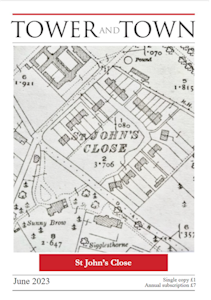

Tower and Town, June 2023 (view the full edition) (view the full edition)Clergy LetterAs a chaplain and teacher at Marlborough College these words from the musical, 'The King and I,' are to me often proven the case: "It's a very ancient saying, but a true and honest thought, that if you become a teacher, by your pupils you'll be taught.' With galloping advances in Artificial Intelligence, I hate to think that I might someday soon be learning from my students by virtue of what they have learned from Chat GPT rather than from their experiences of our world. But it may sadly be the case that AI is about to radically change the nature and experience of education forever with negative ramifications for us all. For those who have tried it, it's stunning to type a question into Chat GPT and have it turn out, in virtually seconds, an essay with most of the necessary components and key terms to score a decent mark on a GCSE paper. Information Technology experts tell us that over the last twenty years, we have all willingly and naively 'fed the beast' by virtue of our texts, emails, blogs, social media sharing and a host of the other things we 'put online', such that AI has an enormous electronic brain-full of information upon which it can stunningly quickly draw to find the content for virtually any question we might ask it. Will the teaching profession be replaced by something automated? What would be lost? Losing human connectivity on an emotional and even spiritual level in the classroom, as elsewhere, would enhance the temptation already so strong within us to view others as a means to an end, rather than as an end unto themselves. After a decade or two of experiencing our world from behind a computer or mobile phone screen, paying only 'continuous partial attention' to the human beings around us, it's time we close the laptops, put down the phones and meet each other eye to eye once again. We need to be conscious, courageous and committed about making this happen, because addiction to our technology is rampant. It will mean unstopping our ears and ending the 'dialogue of the deaf', re-engaging our auditory nerves and ending the failure of a simple greeting on the street: 'Good morning how are you?' No response, because the person whom we enthusiastically greet has the most recent podcast playing in their ears alone, as they pass. As educators, 'Pupil Voice' is something we are always keen to hear. The younger generations have so much to teach us. It's as true as when 'The King and I' was popular as it is today. It's my prayer that we can work together with the technology and scientific community to ensure that we are served by it and not severed from each other. Since having eaten from the Tree of the Knowledge of Good and Evil, when it comes to advances in technology being put to human advantage, our track record has been frighteningly spotty. Tim Novis |